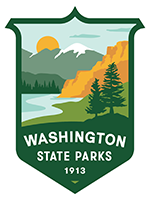Become a Park Ranger
Rangers are essential to Washington State Parks. If you are interested in becoming a Washington State Parks Ranger, read on to learn how to qualify and what the hiring process looks like.
Types of Ranger candidates
There are two types of Ranger candidates: sponsored and non-sponsored.
A sponsored candidate is someone who has not previously worked as an armed ranger or general authority police officer. A sponsored candidate has not attended a law enforcement academy such as PRLEA, PLEA, POST, BLEA or SLETP.
A non-sponsored candidate is currently certified as a general authority peace officer in good standing, and has worked as a full-time law enforcement officer for at least three years (from date of commission). Work experience as a correctional officer, military police, or state park ranger (unarmed) does not qualify.
If you are unsure which type applies to you, contact us at HR.Recruitment@parks.wa.gov.
Out-of-state applicants
We hire many park rangers from out of state. For consistency throughout our testing process, all testing takes place in Washington. If you live out of state, you must travel here at least once to complete the agency-specific testing process.
Minimum eligibility requirements to become a Park Ranger
You can view the minimum eligibility requirements for both entry-level and lateral positions at our Park Ranger 1 information page or Park Ranger 2 information page. Park Rangers 3 and 4 openings will have the specific qualifications listed in the job announcement.
We do not offer waivers for required qualifications.
Disqualifiers for Park Rangers
Certain past behaviors and circumstances may disqualify you as a candidate. For a full list of automatic and potential disqualifiers, go to our minimum qualifications and disqualifiers page.
Potential disqualifiers are considered in context of all other information reviewed during the hiring process. Although you are welcome to contact us to discuss potential disqualifiers, we cannot say with absolute certainty whether certain past behaviors may disqualify you until all relevant information is available to us.
Tattoos
While tattoos are permitted, candidates with any tattoos that are deemed offensive may be disqualified.
Age limits
We have a minimum age requirement of 21 years old for armed Park Rangers 2-3, but have no maximum age limit.
When to apply
You may apply at any time after you meet the minimum requirements of the position.
However, there may be instances where you are currently attending a non-sponsored academy (for example PLEA and SLETP) within a month or two of a scheduled oral panel. Please contact us at HR.Recruitment@parks.wa.gov with specific questions.
If you are currently in the military and meet our minimum requirements, you can begin the application process up to six months before your separation date, depending on your availability to be present at scheduled interviews and exams.
Hiring process for Park Ranger candidates
Although all candidates must apply through www.careers.wa.gov or from our Job Page, the hiring processes for sponsored and non-sponsored candidates are almost identical. Generally, the hiring process takes three to four months to complete. Below are the general hiring phases:
Phase I
During Phase I, you may apply online during an open recruitment period.
Washington State Parks hires year-round for Park Rangers. If you don't see the job announcement, we recommend using the "Job Alerts" function on careers.wa.gov. The job will most likely be posted again within a week or two as we begin a new selection cycle
Be sure your Personal History Statement (PHS) is fully completed with all attachments or you will not be considered for the hiring cycle. There is a significant amount of time between accepting your application and scheduling meetings for the next phase of the hiring process. We recommend candidates spend that time preparing for the initial interview and oral board.
Phase II
In this phase, you will be expected to complete a(n):
- Intake interview (currently virtual)
- Oral board (currently virtual)
- Suitability assessment (currently an online proctored non-medical examination)
- Background investigation. Please note: We are required by law (RCW 43.101.095) to complete a background investigation, polygraph and psychological assessment on every candidate regardless of any prior clearance granted by another agency. High-level military clearance cannot substitute for a background investigation.
Phase III
In this phase, you will be expected to complete a:
- Suitability assessment review
- Conditional offer of employment
- Physical Ability Test (you must pass this test before moving forward with any other testing)
- Polygraph
- Psychological assessment
- Pre-employment medical exam with drug screening
Phase IV
In this phase, you may expect a:
- Final hiring determination
- Park-specific placement
Training for Ranger 1 and 2 candidates
Ranger Training Program
The Ranger Training Program (RTP) is a standardized training program to facilitate your transition from academic learning to performance of law enforcement duties in the field. During the RTP, you will ride with multiple training officers over the course of 14-20 weeks, until it has been determined that you can work independently.
Sponsored candidates advancement
Sponsored (if you don't have previous law enforcement training or have expired credentials*): Park rangers will initially be hired at the Park Ranger 1 classification, as a training step. You will remain at the Ranger 1 level for a minimum 12-month period. You must successfully complete all training requirements to advance to the Park Ranger 2 classification within 18 months of the initial date of hire. All Park Ranger 2s will serve a minimum 6-month trial service period** after completion of the training programs.
Non-sponsored candidates advancement
Non-sponsored (if you have current qualifying law enforcement training): Park rangers will initially be hired at the Park Ranger 1 classification, as a training step. You will remain at the ranger 1 level for a minimum 6-month period. You must successfully complete all training requirements to advance to the Park Ranger 2 classification within 12 months of the initial date of hire. All Park Ranger 2s will serve a minimum 6-month trial service period** after completion of the training programs.
*Expired credentials: Credentials are considered expired 24 months after last working in a commissioned law enforcement capacity. To be eligible for the equivalency course during recruitment, you must have worked in a commissioned law enforcement capacity within the previous 60 months, at the time of your application. If you do not fall within this criteria, you would be considered a sponsored candidate.
**Trial service periods may be extended, not to exceed 12 months.
After being hired
Basic Law Enforcement Academy
All sponsored park rangers are required to complete the Basic Law Enforcement Academy (BLEA). The specific academy location and dates are often based on the class schedule, availability and general timing.
BLEA requires 720 hours (18 weeks) of training. You are hired prior to entering the academy and are considered paid employees while completing initial training. We also pay for your lodging and meals while in attendance.
Park policies do not allow for ride-alongs with commissioned Rangers. If you have questions for a ranger, please email us at HR.Recruitment@parks.wa.gov.
Duty station assignments
Assignment locations depend on availability, agency needs and testing outcomes. We also take your strengths and experience into account when assigning locations.
We provide a list of available duty stations at the start of the hiring process, but this list may change by the time you complete the hiring process. When you prove that you will likely meet the overall qualifications (not guaranteed), we provide an updated list of available parks and will begin discussing available locations.
Final duty stations locations are assigned at the time of your official job offer. You will then report to that park and may spend months at the park before attending the academy or the agency-specific commissioning training while waiting for training availability.

